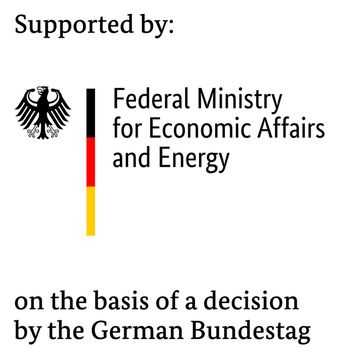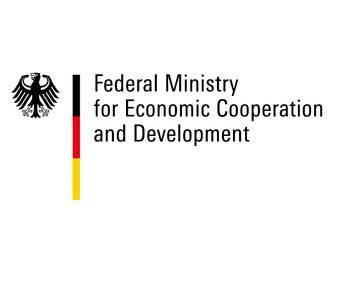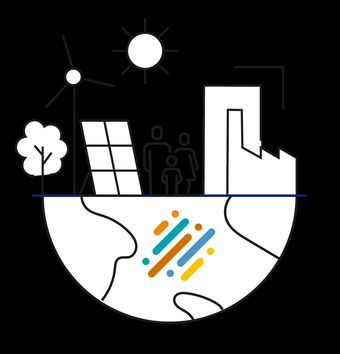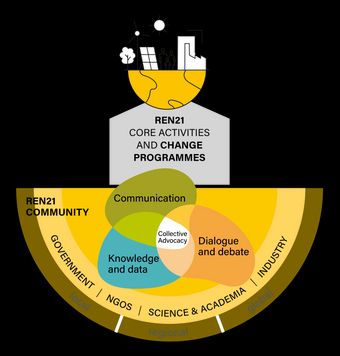Preface
About the GSR
RENEWABLES GLOBAL STATUS REPORT | 2025 COLLECTION
Since 2005, REN21's Renewables Global Status Report (GSR) has tracked developments and emerging trends shaping the future of renewables through a collaborative process involving hundreds of experts worldwide.
Now in its 20th edition, the 2025 GSR builds on the modular format introduced in recent years, offering an even more accessible and comprehensive view of global renewable energy progress.
This year's edition features an expanded set of factsheets that provide concise, sector-specific insights across both supply and demand, reflecting the latest developments in renewable energy.
Together, these publications offer a systemic and cross-sectoral overview of the uptake, impact, and integration of renewables worldwide.


This report was commissioned by REN21 and produced in collaboration with a global network of research partners. Financing was provided by the German Federal Ministry for Economic Cooperation and Development (BMZ) and the German Federal Ministry for Economic Affairs and Energy (BMWE).
A large share of the research for this report was conducted on a voluntary basis.

RENEWABLE ENERGY POLICY NETWORK FOR THE 21st CENTURY
About REN21
REN21 is the only global multi-stakeholder network focused on driving the transition to a renewables-based economy. For over 20 years, we've delivered trusted data, strategic insight, and an impartial platform for debate and collaboration.
Respected for our credibility and convening power, REN21 brings together governments, industry, civil society and academia to bridge silos, spark dialogue and drive informed decisions. We prioritise inclusion – especially of those too often excluded from decision making, including non-traditional actors and those from developing and emerging markets.
With fossil fuel dependence still deeply entrenched and progress too slow and fragmented, REN21 is evolving its approach to tackle the systemic barriers stalling the transition. By leveraging our unique network and launching targeted Change Programmes, we aim to drive the deep structural shifts needed for the energy transition – a shift that underpins resilient, secure and equitable societies, and is essential to realise a world that runs on renewables.
Building the renewables-based economy

REN21's Approach:Orchestrating Systemic Change through a Mobilised Community
REN21 enables the shift to a renewables-based economy by aligning actors, shaping agendas and enabling action at scale.
Our approach is anchored in three core pillars: trusted data and intelligence, inclusive convening and debate, and strategic communication — delivered through a dynamic toolbox of high-impact activities such as dialogues, roundtables, campaigns and policy briefings.
At the centre is our diverse global community. REN21 works with and through this network — governments, industry, civil society and more — who, collectively, act as the real change agents. As an independent orchestrator, REN21 connects the dots, fosters collaboration and facilitates collective action.
This approach comes to life through our flagship Change Programmes: cross-sector initiatives co-created to dismantle the structural barriers, amplify advocacy and drive progress.

REN21 Members
GOVERNMENTS
Australia
Austria
Brazil
Denmark
Dominican Republic
Georgia
Germany
India
Republic of Korea
Mexico
Morocco
Norway
Panama
Río Negro Province, Argentina
South Africa
South Australia State, Australia
Spain
United Arab Emirates
United States
Zimbabwe
INTER-GOVERNMENTAL ORGANISATIONS
Asia Pacific Energy Research Centre (APERC)
Asian Development Bank (ADB)
ECOWAS Centre for Renewable Energy and Energy Efficiency (ECREEE)
Electric Power Council of the Commonwealth of Independent States (Executive Committee) (EPC)
European Commission (EC)
Global Environment Facility (GEF)
International Energy Agency (IEA)
International Renewable Energy Agency (IRENA)
Islamic Development Bank (IsDB)
Latin American Energy Organization (OLADE)
Regional Center for Renewable Energy and Energy Efficiency (RCREEE)
United Nations Development Programme (UNDP)
United Nations Environment Programme (UNEP)
United Nations Industrial Development Organization (UNIDO)
World Bank (WB)
INDUSTRY ASSOCIATIONS
Africa Minigrid Developers Association (AMDA)
Alliance for Rural Electrification (ARE)
American Council on Renewable Energy (ACORE)
Asia Pacific Urban Energy Association (APUEA)
Associação Lusófona de Energias Renováveis (ALER)
Chinese Renewable Energy Industries Association (CREIA)
Clean Energy Council (CEC)
Euroheat & Power (EHP)
European Heat Pump Association (EHPA)
European Renewable Energies Federation (EREF)
Global Off-Grid Lighting Association (GOGLA)
Global Solar Council (GSC)
Global Wind Energy Council (GWEC)
Green Hydrogen Organisation (GH2)
Indian Renewable Energy Federation (IREF)
International Geothermal Association (IGA)
International Hydropower Association (IHA)
International Union of Railways/Union Internationale des Chemins de Fer (UIC)
Long Duration Energy Storage Council (LDES)
Portuguese Renewable Energy Association (APREN)
RE100/Climate Group (RE100)
RES4Africa Foundation (RES4Africa)
Solar Heat Europe (SHE)
SolarPower Europe (SPE)
Union Internationale des Transports Publics (UITP)
World Bioenergy Association (WBA)
World Biogas Association
World Wind Energy Association (WWEA)
NON-GOVERNMENTAL ORGANISATIONS
350.org
African Association for Rural Electrification (Club-ER)
Asociación Ivy
CDP
Clean Cooking Alliance (CCA)
Climate Action Network International (CAN-I)
Coalition de Ciudades Capitales de las Americas (CC35)
Collaborative Labeling and Appliance Standards Program (CLASP)
Energy Cities
Energy Peace Partners (EPP)
European Youth Energy Network (EYEN)
Fundación Renovables (FER)
Global Forum on Sustainable Energy (GFSE)
Global Women's Network for the Energy Transition (GWNET)
Green Economy Coalition (GEC)
Greenpeace International
ICLEI – Local Governments for Sustainability
Institute for Sustainable Energy Policies (ISEP)
International Electrotechnical Commission (IEC)
International Institute for Sustainable Development (IISD)
Jeune Volontaires pour l'Environnement (JVE)
Mali Folkecenter (MFC)
Power for All
Power Shift Africa
Renewable Energy and Energy Efficiency Partnership (REEEP)
Renewable Energy Institute (REI)
Renewables Grid Initiative (RGI)
Solar Cookers International (SCI)
Solutions for Our Climate (SFOC)
Sustainable Energy Africa (SEA)
Sustainable Energy for All (SEforALL)
The Global 100% Renewable Energy Platform (Global 100%RE)
The Nature Conservancy (TNC)
Women Engage for a Common Future (WECF)
World Council for Renewable Energy (WCRE)
World Future Council (WFC)
World Wide Fund for Nature (WWF)
SCIENCE AND ACADEMIA
AEE – Institute for Sustainable Technologies (AEE-INTEC)
Council on Energy, Environment and Water (CEEW)
Fundación Bariloche (FB)
International Institute for Applied Systems Analysis (IIASA)
International Solar Energy Society (ISES)
National Renewable Energy Laboratory (NREL)
National Research University Higher School of Economics Russia (HSE)
South African National Energy Development Institute (SANEDI)
Stockholm Environment Institute (SEI)
The Energy and Resources Institute (TERI)
University of Technology – Institute for Sustainable Futures (UTS)
World Resources Institute (WRI)
MEMBERS AT LARGE
Michael Eckhart
Rabia Ferroukhi
James Fletcher
David Hales
Kirsty Hamilton
Rosilena Lindo Riggs
Peter Rae
MULTI-STAKEHOLDER NETWORK PARTNERSHIP
Hydropower Sustainability Alliance (HSA)
SLOCAT Partnership on Sustainable, Low Carbon Transport (SLOCAT)
PRESIDENT
Ramón Méndez Galain
EXECUTIVE DIRECTOR
Rana Adib
Acknowledgements
REN21 DATA AND KNOWLEDGE TEAM
Jad Baba
Janne Luise Piper
Andrea Wainer
Jiayi Wang
Glen Wright
SPECIAL ADVISORS
Janet L. Sawin
Freyr Sverrisson
RESEARCHERS
Siddharth Goel (Lead Researcher)
Pedro Chevez (Buildings and Energy Efficiency)
Hind Couzin (Industry and Transport)
Jonathan Lyons (Industry, Geothermal and Ocean)
Janet Sawin (Solar Thermal and Wind Power)
Kristin Seyboth (Finance and Investment)
Freyr Sverrisson (Geothermal and Hydropower)
Richard Thonig (Concentrated Solar Power)
Gianluca Tonolo (Solar PV)
Maria van Veldhuizen (Agriculture)
DATA AND PROJECT SUPPORT
Nicolas AchuryNoelle Okwedy
Alexandre Roussel
Hend Yaqoob
EDITING, DESIGN AND LAYOUT
Lisa Mastny (Editor)
weeks.de Werbeagentur GmbH (Design)
PRODUCTION AND COMMUNICATION
REN21 Secretariat, Paris, France
CONTRIBUTORS
Mohammed Abdalghafoor (Ernst and Young); Hadiza Abdulmumini (SDG7 Youth Constituency/IRENA Youth Council); Mahmoud Abou Elenen (GE Vernova); Hassan Aboughalma (Georenco); Rob Ackril (Nottingham Trent University); Sunday Richardsson Adesuyi (independent researcher); Salem Afeworki (Value Sustainability); Florencia Agatiello (RELP); Gamze Akarsu (Nature Biodiversity Risk); Housam Al Rakouki (Fraunhofer IEG); Sami Al-Nabulsi (independent consultant); Rajia Alhabouby (Innovation Energie Developpement); Nevin Alija (Global Future Energy Leaders); Yavar Anani (Mapna Group); Margalita Arabidze (Ministry of Economy and Sustainable Development of Georgia); Ivana Audia (United Nations Environment Programme Copenhagen Climate Centre); Olurotimi Olakunle Awodiji (University of Jos); Bouramdane Ayat-Allah (independent consultant); Fadeke Ayoola (NET Africa); Nupur Bapuly (The Nature Conservancy); Emma Baz (ArcelorMittal); Franco Borrello (WindSol Consulting); Wemogar Elijah Borweh (University of Liberia); Ayat-Allah Bouramdane (International University of Rabat); Gonzalo Bravo (Bariloche Foundation); Christoph Brunner (AEE-Institute for Sustainable Technologies – AEE INTEC); Bernardo Joel Carrillo Castillo (independent consultant); Chia-Wei Chao (Taiwan Climate Action Network); Bhanu Venkata Krishna Chennapragada (Gayatri Vidya Parishad College of Engineering); Luiz Miranda Ciochetti (Energyc); Suani Coelho (University of São Paulo); Giuseppe Costanzo (WindEurope); Hind Couzin (independent consultant); Nour El Houda Daas (Deutsche Gesellschaft für Internationale Zusammenarbeit GmbH – GIZ); Duttatreya Das (Ember Energy); Saikat Das (YOUNGO Energy Working Group); Pedro R. Días (Solar Heat Europe); Ana Díaz Vidal (Sciences Po); Nhat Do (International Institute for Sustainable Development – IISD); Fengli Du (China Solar Thermal Alliance); Julie Dulce (Manila Electric Company); Gordon Edge (International Hydropower Association – IHA); Lydia El Bouazzati (independent consultant); Bärbel Epp (solrico); Oghosa Erhahon (Long Duration Energy Storage Council); A. Ricardo J. Esparta (EQAO/BlockC); Rodrigo Valdovinos Flores (IDMA Institut Chile); Panagiotis Fragkos (E3Modelling); Theophilus Adu Frimpong (Cape Coast Technical University); Shirish S Garud (independent consultant); Duncan Gibb (Regulatory Assistance Project); Pagindhu Yudha Ginting (PT. Indonesia Pomalaa Industry Park); Anastasia Grabco (DVC Partners); Stefan Gsänger (World Wind Energy Association); Elif Gündüzyeli (The Nature Conservancy); Leif Gustavsson (LGT); Andrea Carolina Gutierrez Gomez (University of São Paulo); Siena Hacker (CLASP); Fusun Haklidir (İstanbul Bilgi University); John Hensley (American Clean Power Association); Gabriela Hernández Luna (CIICAp-UAEM); Rainer Hinrichs-Rahlwes (European Renewable Energies Federation); Catharina Horn (NOW GmbH); Abdulwahab Ibrahim (University of Ilorin); Sammy Jamar (Continent Rising); Wim Jonker Klunne (Energy4Africa); Suraj Kanojia (independent consultant); Kamil Kaygusuz (Karadeniz Teknik Üniversitesi); Amin Yahya Khotbehsara (Mapna Group); Shirley Kisuya (independent consultant); Shigeki Kobayashi (Transport Institute of Central Japan); Bharadwaj Kummamuru (World Bioenergy Association); Abigail Kuria (CLASP); Bernard Kwofie (Komfuekuman Foundation); Tara Laan (IISD); Maryse Labriet (Eneris Consultants); Dana Lawrence (independent consultant); Nathalie Ledanois (independent consultant); Alejandra Leon (World Bioenergy Association); Debora Ley (United Nations Economic Commission for Latin America and the Caribbean); Jiang Lin (University of California at Berkeley); Rosilena Lindo (independent consultant); Njoke Mbanda Lionel (Global SDGs and Leadership Development Center); Nkweauseh Reginald Longfor (Sophia University); Juan Roberto Lozano-Maya (Mexico National Energy Control Center); Jonathan Lyons (TheGreenConsult); Abubakar Musa Magaga (Nigerian Institute of Transport Technology); Thailys Campos Magalhães (University of Porto); Kamil Maqsood (REN21); Brandon Marler (IHA); Gaëtan Masson (IEA PVPS); Gabriel Mbangu Simau (University of Zambia); Jonathan Mhango (independent consultant); Doug Miller (Energy Peace Partners); Pradeep Kumar Monga (World Biogas Association); Saurabh Motiwala (Indian Institute of Technology Bombay); Sabatha Mthwecu (Solar Rais); Sumoni Mukherjee (Changescape Consulting); Namiz Musafer (Integrated Development Association – IDeA Kandy); Mussa Abbasi Mussa (Ministry of Energy, Tanzania); Gamuchirai Mutezo (Madam Waste and University of Johannesburg); Amon Mwadime (Africa Minigrid Developers Association); Daya Ram Nhuchhen (City of Edmonton); Onyekachi Nwafor (KatexPower); Brian Nyaware (C40 Cities); Noelle Okwedy (Nextier); Victor Otieno (World Resources Institute – WRI); Josh Oxby (SDG7 Youth Constituency); Ramesh Poluru (The INCLEN Trust International); Ramendra Prasad (University of Fiji); Liliana Proskuryakova (HSE University); Pallav Purohit (International Institute for Applied Systems Analysis); Mohammad Javad Rahimi (FSTco Center for Renewable Energies); Swasti Raizada (IISD); Munira Raji (University of Plymouth); Nizomiddin Rakhmanov (independent consultant); Bard Rama (independent consultant); Shayan Razaghy (independent consultant); Dave Renne (International Solar Energy Society); Alejandra Romano (Fundación Bariloche); Heather Rosmarin (InterAmerican Clean Energy Institute); Ana Rovzar (Global Renewable Alliance); Bikash Kumar Sahu (Torrent Power Ltd); Khalid Salmi (independent consultant); Miguel Schloss (Surinvest Ltda.); Henning Schuler (Ocean Energy Europe); Cécile Seguineaud (independent consultant); Martina Serao (RES4Africa Foundation); Ali Shahhoseini (Mapna Group); Mweetwa Mundia Sikamikami (TiBE); Kamil Sobczak (RenewStats.com); Laiz Souto (University of Bath); Monika Spörk-Dür (AEE INTEC); Elios Sprung (GIZ); Anneli Stutz (GIZ); Paul H. Suding (independent consultant); Mehdi Tafazoli (Mapna Group); Yael Taranto (SHURA Energy Transition Center); Faruk Telemcioglu (independent consultant); Richard Thonig (CSP.guru); Fabrice Fouodji Toche (Action pour la Formation et la Gestion des Ressources Naturelles – AFOGREN); Gianluca Tonolo (Haki Energy Solutions); Galyna Trypolska (Institute for Economics and Forecasting of the National Academy of Sciences of Ukraine); Prachi Ugle (independent consultant); Rodrigo Valdovinos (IDMA Institut Chile); Kartik Veerakumar (independent consultant); Matías Verd (Association of Energy Engineers); Martha Wakoli (CLASP); Marion Walker (Zentrum für Sonnenergie- und Wasserstoff-Forschung Baden-Württemberg – ZSW); Yu Wang (Xuchen Energy); Leianne Wijnhoud (WRI); Shane Wilson (independent consultant); Jeremy Woods (Centre for Environmental Policy, Imperial College London); Peter Yang (Case Western Reserve University); YOUNGO Energy Working Group (United Nations Framework Convention on Climate Change); Hameedullah Zaheb (Kabul University); Feng Zhao (Global Wind Energy Council).
Disclaimer
REN21 releases issue papers and reports to emphasise the importance of renewable energy and to generate discussion on issues central to the promotion of renewable energy. While REN21 papers and reports have benefited from the considerations and input from the REN21 community, they do not necessarily represent a consensus among network participants on any given point. Although the information given in this report is the best available to the authors at the time, REN21 and its participants cannot be held liable for its accuracy and correctness.
The designations employed and the presentation of material in the maps in this report do not imply the expression of any opinion whatsoever concerning the legal status of any region, country, territory, city or area or of its authorities, and is without prejudice to the status of or sovereignty over any territory, to the delimitation of international frontiers or boundaries and to the name of any territory, city or area.
The methodology and taxonomy of the REN21 Policy Database were updated for the Renewables 2025 Global Status Report to improve clarity and reflect evolving policy trends. As a result, data presented in this edition may not be fully comparable with figures published in previous Renewables Global Status Reports.